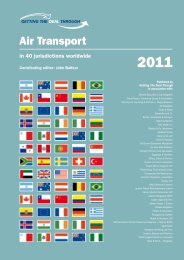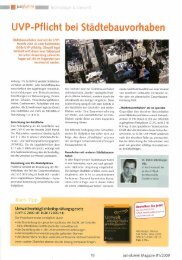The International Comparative Legal Guide to Aviation Law ... - Jarolim
The International Comparative Legal Guide to Aviation Law ... - Jarolim
The International Comparative Legal Guide to Aviation Law ... - Jarolim
Create successful ePaper yourself
Turn your PDF publications into a flip-book with our unique Google optimized e-Paper software.
<strong>Jarolim</strong> Flitsch Rechtsanwälte GmbH<br />
Austria<br />
4.10 What are the mechanisms available for the protection of<br />
intellectual property (e.g. trademarks) and other assets<br />
and data of a proprietary nature?<br />
Trademarks can be registered under the Austrian Trademark Act<br />
(Markenschutzgesetz - MSchG) in the Austrian Trademark Register;<br />
however, there is also protection available for unregistered marks<br />
and labels, if proof can be provided of their existence and use.<br />
Patents can be registered in the Austrian Patent Register under the<br />
Austrian Patent Act (Patentgesetz - PatG); designs and utility<br />
models (Geschmacks- und Gebrauchsmuster) can be registered<br />
with the Austrian Patent Office under the Model Protection Act<br />
(Musterschutzgesetz - MSchG).<br />
<strong>The</strong>re is no registry of proprietary rights. Protection is available for<br />
interference with possession (Besitzstörung) in simplified<br />
proceedings before the district courts. Further remedies are<br />
available under Austrian law for violation and interference with<br />
proprietary rights.<br />
4.11 Is there any legislation governing the denial of boarding<br />
rights?<br />
As a Member State of the EU, EC Regulation No. 261/2004<br />
establishing common rules on compensation and assistance <strong>to</strong><br />
passengers in the event of denied boarding and of cancellation or<br />
long delay of flights is the relevant legislation for denial of<br />
boarding.<br />
4.12 What powers do the relevant authorities have in relation<br />
<strong>to</strong> the late arrival and departure of flights?<br />
In commercial aviation, the flight slots must be allocated, in<br />
facilitated airports by the airports itself, in coordinated airports by<br />
the Schedule Coordination Austria GmbH (SCA) pursuant <strong>to</strong> the<br />
procedure set out in the EEC Regulation No. 95/93 on common<br />
rules for the allocation of slots at Community Airports, as amended<br />
by EEC Regulation No. 793/2004 and EC Regulation No.<br />
545/2009, and the Austrian Slot Coordination Regulation 2008.<br />
<strong>The</strong> authority may deny landing and/or departure if requirements<br />
outlined in the applicable rules are not complied with.<br />
4.13 Are the airport authorities governed by particular<br />
legislation? If so, what obligations, broadly speaking, are<br />
imposed on the airport authorities?<br />
<strong>The</strong> prime legislation for airport authorities is the LFG, which<br />
requires every airport opera<strong>to</strong>r <strong>to</strong> issue and publish Conditions of<br />
Use (Zivilflugplatzbenützungsbedingungen), which shall guarantee<br />
the non-discrimina<strong>to</strong>ry access <strong>to</strong>, and safe and economic operation<br />
of the airport. <strong>The</strong>se must be approved by the BMVIT. <strong>The</strong><br />
Conditions of Use must contain the Tariff Regulations<br />
(Tarifordnung). <strong>The</strong> airport charges must be calculated according<br />
<strong>to</strong> the Airport Charges Act (Flughafenentgeltegesetz - FEG), which<br />
entered in<strong>to</strong> force on 1 July 2012 and implemented Directive<br />
2009/12/EC on airport charges.<br />
Ground handling services and requirements for the access <strong>to</strong> ground<br />
handling services are governed by the Airport Groundhandling Act<br />
(Flughafen-Bodenabfertigungsgesetz - FBG). <strong>The</strong> FBG<br />
implemented Directive 96/67/EC on access <strong>to</strong> the ground handling<br />
market at Community airports, which ensures the liberalisation of<br />
the ground handling services in the EU.<br />
Austria<br />
<strong>The</strong> relevant authority for determination and approval of flight<br />
schedules in Austria is the ACG. <strong>The</strong> rules set out for flight<br />
schedules are found in the LVR.<br />
Accordingly, each flight schedule needs <strong>to</strong> be reported by the<br />
respective pilot <strong>to</strong> the ACG, including place of departure, speed,<br />
flight altitude, maximum flight time and expected landing place and<br />
time. Actual departure needs <strong>to</strong> be reported <strong>to</strong> the authority, unless<br />
the expected landing time will not be exceeded by 15 minutes, or it<br />
was announced that no departure notice would be made, or if such<br />
notice could not be made. Special notices need <strong>to</strong> be made if<br />
scheduled landing times cannot be met by more than 30 minutes.<br />
Approval by the authority is then required for the actual departure<br />
time. Special rules apply for emergency landings.<br />
4.14 What global distribution suppliers (GDS) operate in<br />
Austria?<br />
<strong>The</strong> two main reservations systems used by travel agencies in<br />
Austria are Amadeus (distributed through Amadeus Austria<br />
Marketing GmbH) and Galileo (distributed through TraviAustria<br />
Datenservice für Reise und Touristik GmbH & Co Nfg KG).<br />
4.15 Are there any ownership requirements pertaining <strong>to</strong><br />
GDS’s operating in Austria?<br />
<strong>The</strong>re is no national legal regime that governs GDS. Regulation<br />
(EC) No. 80/2009 on a Code of Conduct for computerised<br />
reservation systems is directly applicable in Austria.<br />
ICLG TO: AVIATION LAW 2013<br />
© Published and reproduced with kind permission by Global <strong>Legal</strong> Group Ltd, London<br />
WWW.ICLG.CO.UK<br />
23





